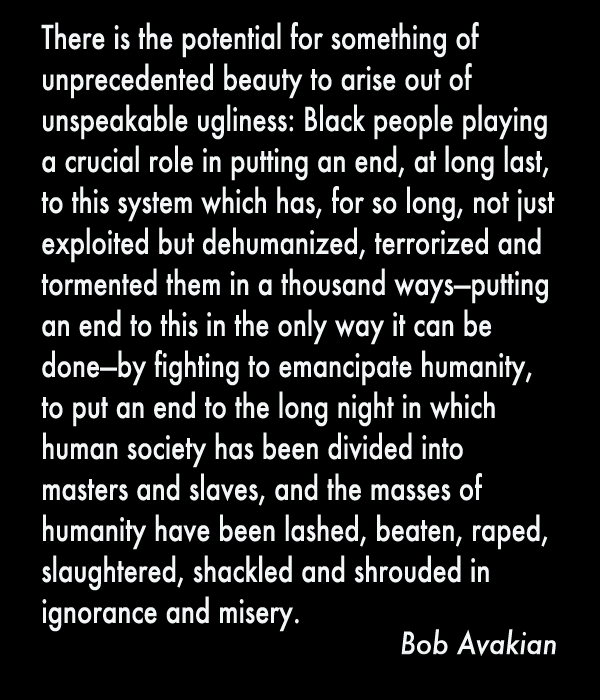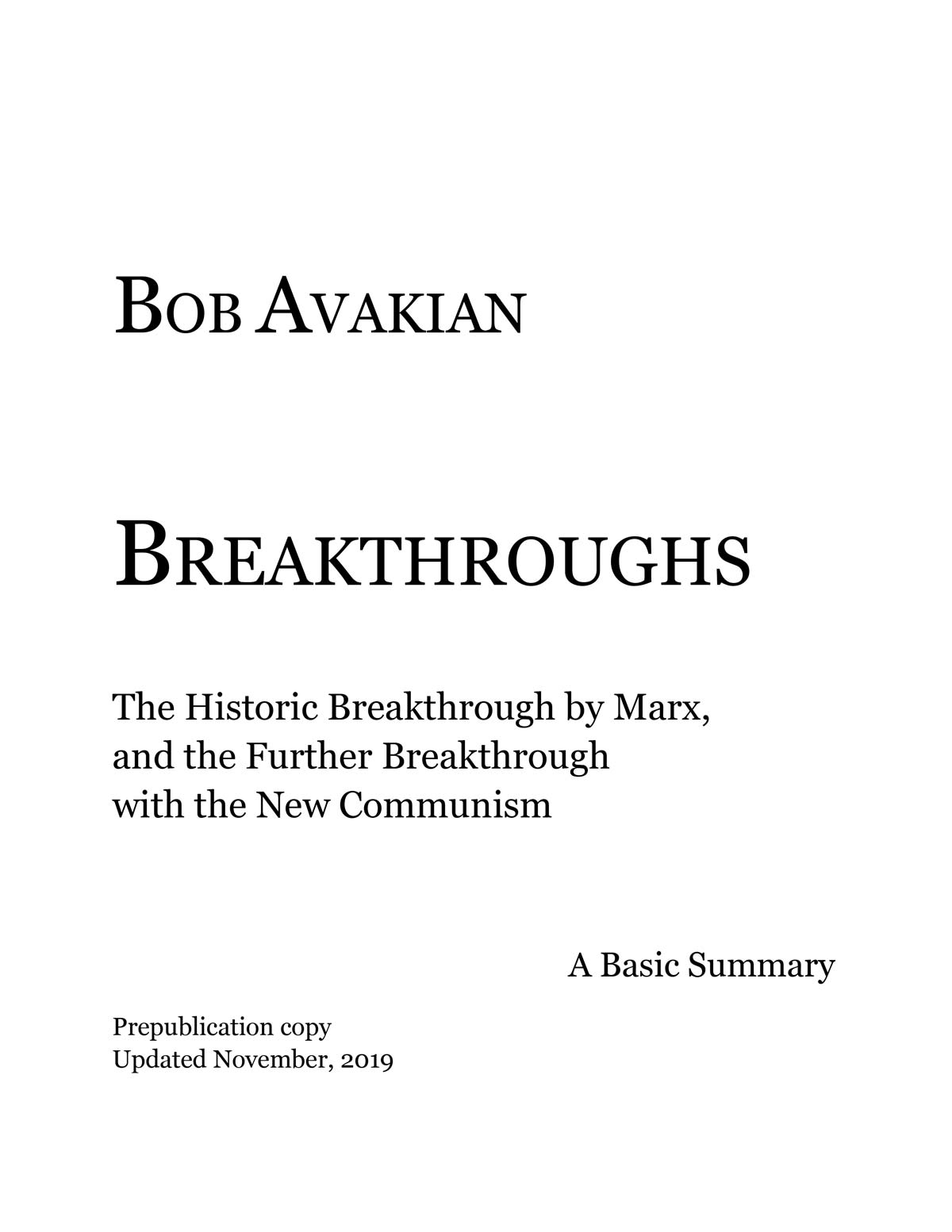More on Ice Cube and the Mirage of Black Economic Empowerment
by Raymond Lotta
| revcom.us
In my article Ice Cube’s Dangerous Bullshit, Or... The Myth of Black Economic Empowerment and The Reality of Trump’s Genocidal Racism, I cite the statistic that when the Emancipation Proclamation was signed in 1863, Black people owned 0.5 percent of the wealth of the country, and that today, more than 150 years later, the share has barely changed, at less than 2 percent.
When encountering this telling and revealing fact, some people ask: Why then couldn’t a massive infusion of investment capital into the Black community, like Ice Cube’s Contract with Black America advocates and Trump’s so-called “Platinum Plan” promises, turn this situation around?
The short answer is this: a) the kind of investment Ice Cube calls for is not going to happen on that scale; and b) even to the degree that there would be some increased capital investment, it would not, and could not, lead to overcoming the oppressive—and, for masses of people, desperate—conditions they are subjected to under this capitalist-imperialist system. What follows goes deeper into this.
1) Major changes in the world and U.S. economy over the last 50 years have profoundly affected how Black people are “inserted” into the economic structure and relations of U.S. society. The capitalist quest for the highest possible profit, driven by competition, and the increasing ability of capitalists to invest all over the globe—has led to the disappearance of many industrial jobs in the inner cities of U.S. These manufacturing jobs had been a source of some steady employment for Black workers. But factories have been relocated to suburbs... and much more massively to other parts of the world, especially countries of the “global south,” or the Third World.
The reality of capital investment is exploitation for profit. Capitalists compete with each other for profit and market share. Auto companies, technology leaders like Apple, search out the highest possible profit and invest in efficient/cost-effective ways to make profit. And profit is ultimately based on exploiting wage laborers: those who must, in order to survive and enable their families to survive, sell their capacity to work to capitalist employers... when work is available. This is a global system of exploitation: spanning parts-supply plants in Mexico, garment sweatshops in China and Bangladesh, or in mines in which children work in Congo.
Globalization and automation have contributed to a situation where Black people suffer chronically high rates of unemployment. Where many young Blacks, especially those swept into the horrific vortex of mass incarceration, become “disconnected” from the formal economy of wage work... and are in and out of, or permanently deprived of work. Where many young Blacks have to hustle in “criminalized forms of work” in order to get by.
2) As capitalism-imperialism has grown more highly globalized, the U.S. has also become a more “post-industrial” economy. Major U.S. cities, where large numbers of Black people live, have seen a tremendous rise of investment in real estate; in financial services; in office parks; in high-end medical-educational complexes; affluent “consumer spaces”; and profit-driven gentrification.
It is into these sectors that capital flows: drawn by the magnetic pull of where profits are greatest and by the strategic needs of the U.S. empire to have its financial command and control centers in cities like NYC, LA, and Chicago.
Now Ice Cube comes along and calls for the massive investment of capital in the Black community. But here’s the rub: big capital doesn’t get a “competitive edge” by investing in decent housing and health care in the inner city—or in improving the conditions of life for the broad masses of people. This is not a system that deliberates at the start of the year, “OK, how can we create more good-paying, meaningful jobs for Black people?”
The brute reality is... from the standpoint of profit-making capital, large sections of the Black population are now a “surplus population,” especially among the young and less educated. They are no longer needed. Certainly not because great social needs have been met, or because skills and talents don’t exist... but because they are no longer profitably exploitable.
3) Over and over, when Republican and Democratic administrations alike have set out to create “enterprise” or “opportunity zones” in Black communities... when the government has offered tax breaks, “development incentives,” and subsidies to steer capital into deteriorating Black communities... the results have been predictably and painfully the same.
A few have benefited—while the fundamental conditions of life for the basic people remain impoverishment and punitive control.
These government programs and government-backed private investments have not put an end to segregation and redlining... or to child poverty... or to double-digit unemployment for young workers... or to mass evictions and mass incarceration. Nor could they...
*To bring about those kinds of changes would require a complete and total reordering of priorities and a radical and massive reallocation of resources that conflict with the “profit-driven” logic of capital.
*To bring about these kinds of changes would require the complete and total transformation of the social institutions of America as they have evolved and as capitalist-imperialist America functions as a white supremacist, class-divided society in which production for profit rules. A social structure that locks Black people into savage inequality.
In short, to change these oppressive conditions, requires changing everything... making the revolution to overthrow this system and bring about a society and world in which exploitation and oppression are no more.
As Bob Avakian says in Breakthroughs: The Historic Breakthrough by Marx, and the Further Breakthrough with the New Communism, A Basic Summary:
In... speaking to the social mobility that is often raised as one of the great features of capitalist society, Marx, in another major work of his, the Grundrisse, pointed out that individuals may change their social and class position within a society like this, but the masses of people can only escape from oppressive production and social relations by revolutionary means—by overthrowing and abolishing the system that is founded on and embodies those relations.
One last note on Black businesses. Black entrepreneurs might see a potentially lucrative “market” with a more “loyal” customer base in the Black community. But these Black capitalists do not command the resources for large-scale investments. And as capitalists, they must compete with, and many have no chance in surviving the competitive battle with, the dominating likes of Walmart and Amazon—with their extended global supply lines based on savage exploitation the world over.
So these are essential reasons why “Black economic empowerment” is a mirage. And why the Contract with Black America is yet another in the litany of false promises and recycled deceptions.
Listen to the podcast: “RACIAL OPPRESSION CAN BE ENDED— BUT NOT UNDER THIS SYSTEM”
by Bob Avakian
Or read it here.

Get a free email subscription to revcom.us:


